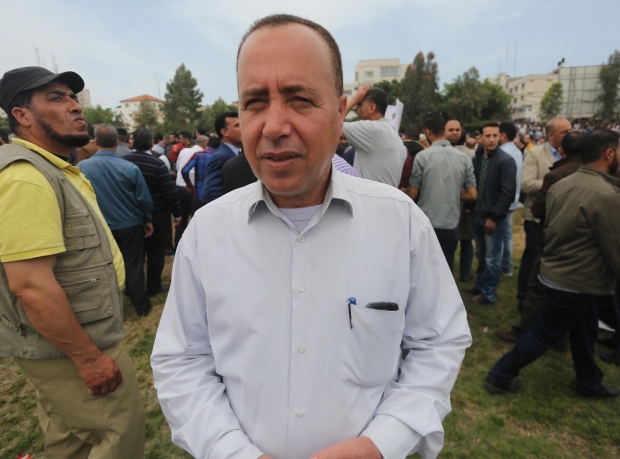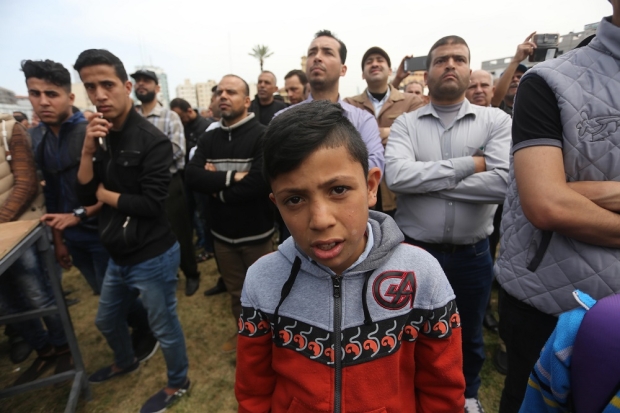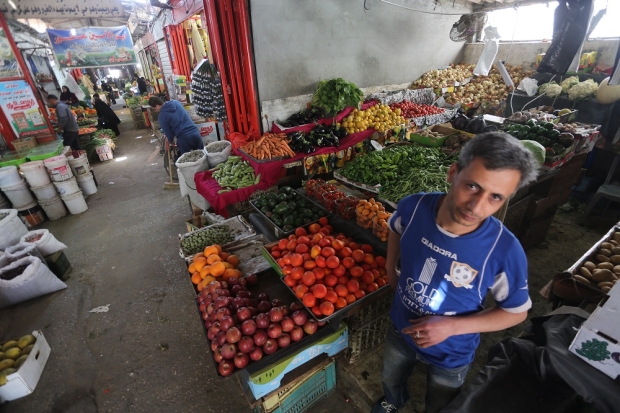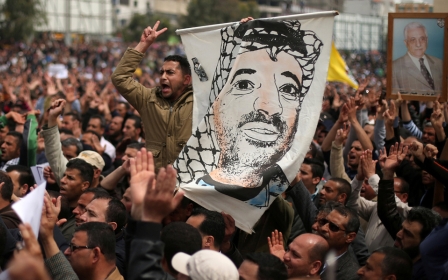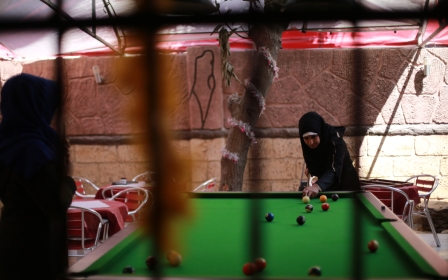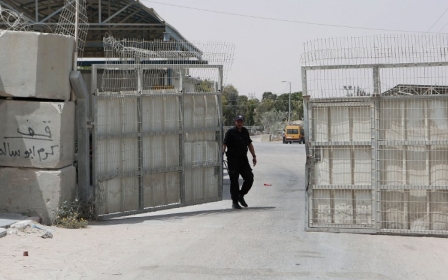Gazans stare into the abyss after West Bank imposes pay cuts
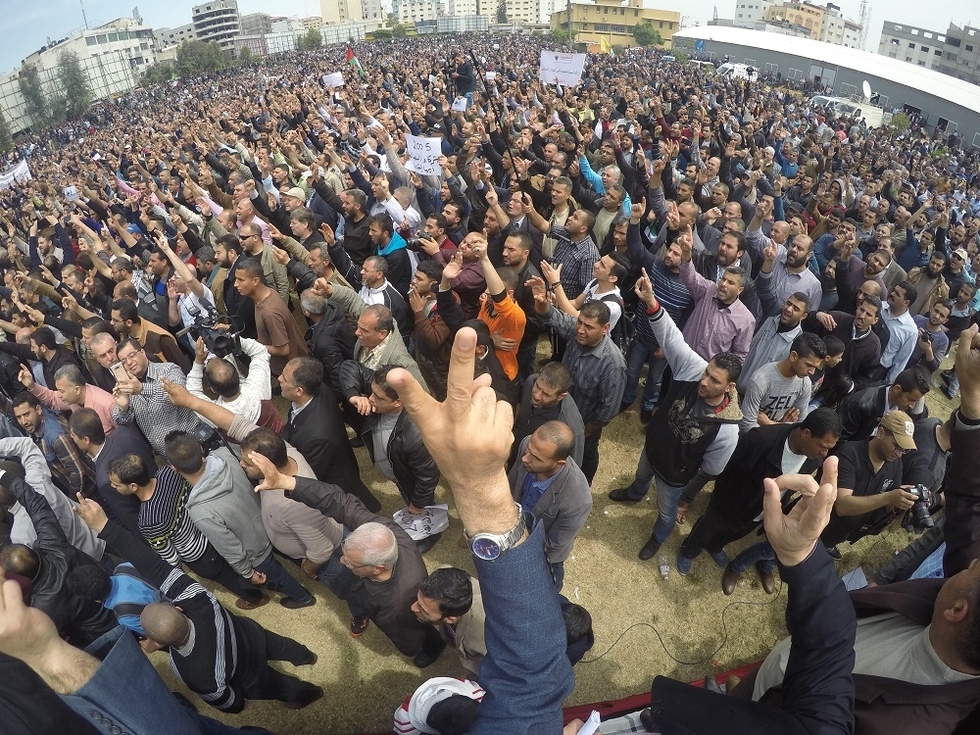
Gaza City - Moshtaha Mosallem remembers the shock of opening his last pay packet. "When I went to the bank to get my salary for March, I found minus seven shekels," said the 48-year-old Gazan health worker.
The 48-year-old health worker's 3,600 shekel a month salary, the equivalent of $980, had been cut by almost half with almost no warning, leaving him in arrears and with no money to feed his five children.
Last Saturday, he joined tens of thousands of employees of the Palestinian Authority in Gaza, to protest against the decision to cut the salaries of 58,000 people by up to 30 percent. West Bank employees, however, were unaffected.
Mosallem said even the 30 percent figure was wrong. "I took a loan last year to help my son in his marriage. After cutting 42 percent of my salary, and paying electricity bills and loan payments, I found nothing in my bank account," he said.
"They didn't warn us. They took the decision a day before the salaries were sent to banks. We couldn't prepare."
Yousif al-Mahmoud, the spokesman of the Palestinian government, said the decision was taken after the EU reduced its foreign aid contributions.
Mosallam is having none of that. "There is no justification for cutting the salaries of those employees in Gaza and leaving the salaries of their peers in the West Bank. It's just discrimination," he told Middle East Eye.
"The decision is unfair. Those employees obeyed the orders of the president Mahmoud Abbas in 2007, when he told them to stay at their homes after Hamas had taken control over Gaza. And now they are being punished for that?"
There is no justification - the decision is unfair- Moshtaha Mosallem
"Even the salaries of workers in the education and health sectors, who had never stopped working, were cut," he says.
The response in Gaza was an outpouring of anger. Protesters gathered in al-Saraya square in Gaza City last week, calling on the PA's prime minister, Rami Hamdallah, and his finance minister Shukri Bishara to resign: "Leave! Leave, Hamdallah! Don't fight us with the food of our children."
"We lost our sons in the first intifada. We stayed at home and obeyed after the division. If it's an economic crisis, why are we the only victims?"
Protests were not limited to men, as thousands of women and children participated and called for their rights.
Mohammed al-Reefy, 12, came to the protest after finishing school. After bills and loan payments, his father had 150 shekels in the bank for the month.
"My father pays loan instalments. I heard him telling my mother that the following days would be difficult."
"But we are better than my uncle, who was 100 shekels overdrawn."
Soha Abu Mualiq, 42, an educational guide, protested with her colleagues after she suffered a 1,200 shekel cut. "I've never stayed at home. I love my work and I do it diligently. I feel oppressed."
The supermarket owner needs his money and I don't have money.
- Soha Abu Mualiq
Mualiq said the cut meant her four sons would not go to university - she can't afford it any more.
"I'm afraid to go home. The supermarket owner needs his money and I don't have money. I pay 400 shekels each month for a marriage planning company, because I helped my son to get married. How will I deal with all those responsibilities?"
For Gaza employees, even if the decision is cancelled, they will live in danger and fear. "We feel weak. With time, such decisions will be easier, and we won't have any choice but to adapt," Abu Mualiq added.
Danger and fear
Khalil Shaheen, a political analyst based in Ramallah, thinks that the PA aims at getting rid of the majority of its employees.
"This may be the first step. West Bank employees won't be protected from similar decisions in the future."
Shaheen pointed to the indifference of the PA over Gaza.
"Gaza's needs are a heavy burden on the PA," he said. "They prefer to put those responsibilities on the shoulders of Hamas."
Samir Abumodalalla, an associate professor of economics at al-Azhar University in Gaza, said the PA decision was illegal, according to the Basic Palestinian Law of 2003.
"Employee salaries shouldn't be affected by any circumstances. If there is an economic crisis, the PA should have reduced its other expenses without affecting employees."
Abumodalalla said the decision was political and would affect the whole of Gazan society and deepen Palestinian divisions.
"Gaza's taxes and revenue are nearly $900m," he said. "This amount of money is enough to cover salaries. I don't think that it's an economic decision. It's political.
"Since 2007, the PA hasn't employed new Gazans. But the salary budget rose from $1.3bn to $1.96bn. The added $660m is for West Bank employees. Gaza is not the reason for any economic crisis."
Abumodalalla described the decision as "a real crime against Gazans".
"Some employees lost 65 percent of their salaries," he said. "This money runs the wheel of Gaza's economy and trade. And 70 percent of university students don't pay their fees - that figure will rise, causing a new challenge for universities in Gaza."
A life disrupted
The pay cuts have already had visible knock-on effects, as a short walk through any market in the Gaza Strip shows.
For Adli Abu Ouda, 40, who has a vegetable store at al-Zawya market, the situation is dangerous and complicated.
"People are shocked. The cuts decision has negatively affected every Gazan. I haven't seen any customers today. I'm a father for six children and I don't know what to do in these circumstances."
His neighbour, Ahmed Habeeb, 50, adds: "I have a chicken shop. It's known that Friday is the day of chicken in Gaza, but last Friday, I barely sold half of my usual amount."
Ameen al-Jerjawy, 29, a butcher, says the first days of the month are often they busiest as people spend their pay.
Friday is the day of chicken in Gaza. I barely sold half of my usual amount."
- Ahmed Habeeb
"We wait eagerly for this time of the month," he says. "But as you see, even after reducing the prices of the meat, it isn't sold.
"Four families live from this shop. Our destiny is unknown."
Mohammed al-Hwaity, 34, who runs a clothes shop, has a similar tale of woe. His new spring and summer collections lay unsold.
"The last 10 years were catastrophic. The siege, lack of resources, lack of national factories, and reliance on import are all reasons for our current situation," he said.
"The only thing I want is to have my shop full customers every morning. It's a simple and normal dream."
New MEE newsletter: Jerusalem Dispatch
Sign up to get the latest insights and analysis on Israel-Palestine, alongside Turkey Unpacked and other MEE newsletters
Middle East Eye delivers independent and unrivalled coverage and analysis of the Middle East, North Africa and beyond. To learn more about republishing this content and the associated fees, please fill out this form. More about MEE can be found here.


